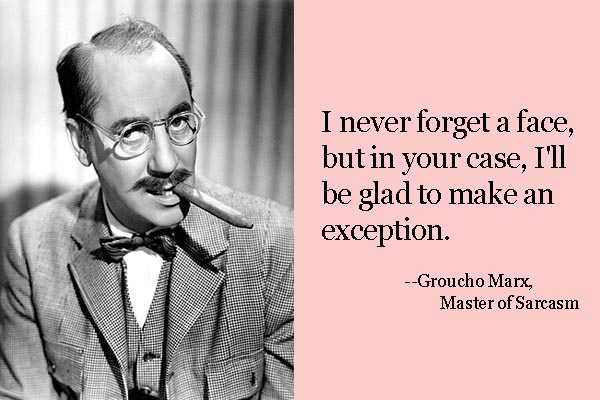 |
| Groucho Marx, Master of sarcasm (Wikipedia) |
Note: Like exaggeration and understatement, sarcasm is an indirect way of speaking that is often misunderstood. In fact, it is very difficult to show the effect of sarcasm in writing, because it really depends on facial expression and tone of voice.
Get Ready: Do you ever use sarcasm? Or have you ever misunderstood someone else when they used sarcasm?
Ann, an American, and her Chinese friend, Jill, are talking about Jill's boyfriend.
Jill: Last week I was angry with my boyfriend and called him "stupid."
Ann: [rolling her eyes] Oh, good job, Jill! THAT'll make him feel special.
Jill: [confused] Really? ... Do you think so?
Ann: No, Jill! I was being sarcastic.Jill: What's "sarcastic"?
Ann: It's hard to describe. It's like when you say the opposite of what you mean.Jill: Why do you do that? Why don't you just say what you want to say?
Ann: Well, sometimes it's funny. It can also be a little mean. Or, in this case, it can be to tell the person that you disagree with what they did, without really scolding them.Jill: How can I tell when you're being sarcastic, and when you're being direct?
Ann: For one thing, my face and my voice will change. For example, did you notice that I rolled my eyes, and I didn't smile? I looked too serious.Jill: OK, what about your voice?
Ann: I made it lower, and I overemphasized my words. Also, my choice of words will exaggerate the meaning. I didn't just say, "That was nice." I really over-praised you.Jill: All right, I think I get it. Can I try it?
Ann: Sure. Let's say your boss is always making you work overtime, and he never praises your work. Someone asks you, "What is your boss like?" What do you say?Jill: [with her face and voice changed] Oh, he's a real sweetheart!
Ann: That's it!
Most learners of English should probably avoid using sarcasm, but it's important to recognize it when others are using it.
- Facial expression: rolling eyes; a very serious look, or an exaggeration of features, like a fake-looking smile.
- Tone of voice: lowered, serious pitch or raised, mocking pitch; slower or faster pace; louder or softer volume. In any case, a person using sarcasm seldom speaks in a straightforward, natural manner.
- Situational cues: If you've just done something well, and your foreign boss says, "Way to go! Great job!" you should feel proud. But if you've just made a big mistake, he's probably being sarcastic, and you should realize he's scolding you.
So watch out for sarcasm. It's really easy to spot! [wink wink]
--------Read more: https://en.wikipedia.org/wiki/Sarcasm
Practice: Match the situation to the sarcastic comment. Then try trying saying them with the proper facial expression and tone of voice.
- Your friend says that a fortune-teller told her she will soon be rich (you don't believe in fortune-tellers).
- A man wants to sell you a car for four times its proper price.
- Your neighbor is painting his house bright pink, with purple around the doors and windows (you don't like it).
- Your friend just came back from a trip and said, because of rain, he never left his room.
- Your friend says she wants to eat healthier, and then walks in with ice cream in one hand and candy in the other.
- Oh, THAT sounds like FUN!
- Wow, what BEAUtiful COLors!
- Yeah, that's a GREAT deal!
- Gee, THAT REALly looks HEALTHY!
- Oh, well, I'm SURE you can believe THAT!
Answers are in the first comment below.
Submitted to the Shenzhen Daily for October 7, 2007
This lesson received 1322 visits on my old site between February, 2012, and June, 2021.


Answers to the Practice: 1 e; 2 c; 3 b; 4 a; 5 d
ReplyDelete